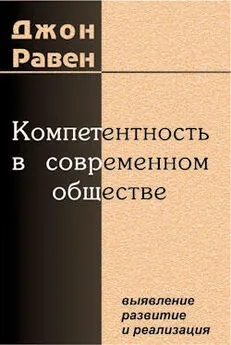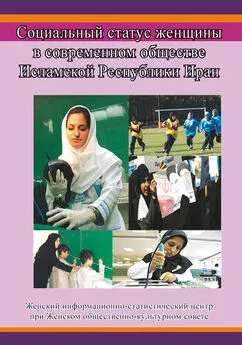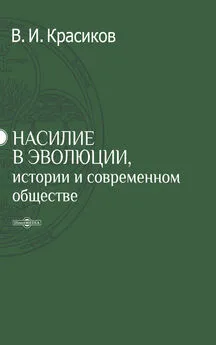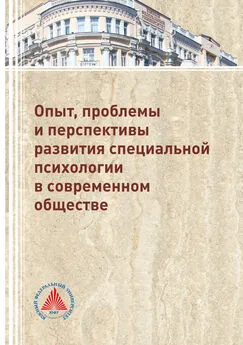Джон Равен - Компетентность в современном обществе
- Название:Компетентность в современном обществе
- Автор:
- Жанр:
- Издательство:Литагент «Когито-Центр»881f530e-013a-102c-99a2-0288a49f2f10
- Год:2002
- Город:М.:
- ISBN:0-7186-0481-4, 5-89353-052-7
- Рейтинг:
- Избранное:Добавить в избранное
-
Отзывы:
-
Ваша оценка:
Джон Равен - Компетентность в современном обществе краткое содержание
Книга известного британского психолога Дж. Равена посвящена тем типам мотивации, в которых нуждается современное общество. В ней рассматриваются способности, установки, роли и диспозиции, которые требуются руководителям, служащим, политикам, социальным работникам и обычным гражданам. Говорится также о политических системах и процедурах подотчетности, необходимых для управления миром, в котором мы живем. Здесь рассказывается о том, как люди представляют себе функционирование общества и собственную роль в обществе. Эта книга о «британском недуге», т. е. о неадекватных убеждениях, ожиданиях, ценностях и установках, и том, как можно попытаться их изменить.
Компетентность в современном обществе - читать онлайн бесплатно ознакомительный отрывок
Интервал:
Закладка:
Такая образовательная практика описана Равеном (Raven, 1977), но эффективнее всего она действует на уровне отдельной организации, на основе внутриорганизационных опросов, для которых наиболее подходит инструментарий, разработанный в ходе настоящего исследования.
Литература
Adorno T. W. (1950) The Authoritarian Personality.New York: Harper.
Advisory Board for Research Councils (1982) Report of the Working Party on Post-Graduate Education.London: HMSO.
Advisory Board for Research Councils and University Grants Committee (1982) Report of a Joint Working Party on the Support of University Scientific Research.London: HMSO.
Almond G. A. and Verba, S. (1963) The Civic Culture.Princeton University Press.
Alvey Committee (1982) A Programme for Advanced Information Technology.London: HMSO.
An CO (1973) Apprenticeship: A New Approach.Dublin: An CO.
Argyris C. (1962) Interpersonal Competence and Organizational Effectiveness.Homewood, 111.: Irwin.
Barron F. and Egan D. (1968) Leaders and Innovators in Irish Management.Human Sciences Sub-Committee INPC.
Benedict SrM. (1976) An Analysis of the Philosophy of Paulo Freire.M.Ed. Thesis. St. Patrick's College, Maynooth, Eire. Dept. of Education.
Brandt Commission (1980) North South: A Programme for Survival.Pan Books, London.
Bray D. W., Campbell R. J. and Grant D. L. (1974) Formative Years in Business.New York: Wiley.
Cattell R. B. (1963) The Personality and Motivation of The Researcher in Taylor C. W. and Barron F. Scientific Creativity.New York: Wiley.
Chan J. (1981). Correlates of Parent-Child Interaction and Certain Psychological Variables Among Adolescents in Hong Kong. in Perspectives in Asian Cross-Cultural Psychology(eds. J. L. M. Binnie-Dawson et al.). Swets and Zeitlinger B. V. Lisse.
Chapman L. (1978) Your Disobedient Servant.London: Chatto and Windus.
Cherns A. B. (1970) Relations Between Research Institutions and Users of Research. Int. Soc. Sci. J., XXII,p.226 – 242. CrockettH.J. (1966) Psychological Origins of Mobility in SmelserN.
J. and Lipset S. M. Social Structure & Mobility in EconomicDevelopment.London: Routledge & Kegan Paul. De Charms R. (1969) Origins, Pawns & Educational Practice in Lesser
G. S. (йd.). Psychology & The Educational Process.Chicago:
Scott, Forseman & Co. Deci E. L. (1971) Effects of Externally Mediated Rewards on Intrinsic
Motivation. J. Pers. Social Psychol., 18,p. 105—115. Dockrell W. B. and Black H. D. (1978) Assessment in the Affective
Domain: What can be done about it?Edinburgh: The Scottish
Council for Research in Education. Donnison D. (1972) Research for Policy. Minerva, X,p. 519 – 537. Doob L. W. (1967) Scales for Assessing Psychological Modernization in Africa. Public Opinion Quarterly, 31,p. 414—421. Drucker P. F. (1959) The Landmarks of Tomorrow.London: Heine —
mann. Dunnette M. D. (1976) Assessing Aptitudes, Skills & Abilities in
Dunnette (йd.). Handbook of Industrial & Organizational Psychology.New York: Rand McNally. Emery F. (1974) Futures We're In.Canberra: Centre for Continuing
Education, Australian National University. Fishbein M. (ed.) (1967) Reading in Attitude Theory and Measurement.New York: Wiley. Flanagan J. C. (1958) Personal and Social Performance Record:
Teachers Guide and Materials.Palo Alto, California: American
Institutes for Research. Flanagan J. C. (ed.) (1978) Perspectives on Improving Education.New
York: Praeger Publishers. Flanagan J. C, (1983) The Contribution of Educational Institutions to the Quality of Life of Americans. Internal. Rev. Appl. Psychol., 32.Flanagan J. C. and Burns, R. K. (1955) The Employee Performance
Record. Harvard Business Review, 33,p. 95 – 102. Flanagan J. C. and Russ-Eft, D. (1975) An Empirical Study to Aidin Formulating Educational Goals.California: American Institutes for Research. Gorman L. and Molloy, E. (1972) People, Jobs & Organizations.
Dublin: Irish Productivity Centre. GrayJ.ef ai. (1983) Reconstructions of Secondary Education: Theory,
Myth and Practice since The War.London: Routledge & Kegan
Paul.
Hackman R. J. and Lawler E. E. (1971) Employee Reactions to Job Characteristics. J. Appl. Psychol. Monogr. 55, p. 259—286.
Hayek F. A. (1960) The Constitution of Liberty.London: Routledge & Kegan Paul.
Herzberg F. (1966) Work and The Nature of Man.New York: Cromwell.
Herzberg F., MausnerB. and Snyderman В. В. (1959) The Motivation to Work.New York: John Wiley.
Hobbs D. J., Beal G. M., and Bohlen J. M. (1964) The Relation of farm operator values to their economic performance.Iowa State Univ. Rural Sociology Reprint. No. 33. June 1964.
Holland J. L. (1959) A Theory of Vocational Choice. J. Counselling Psychol., 6,p. 35—43.
Hornaday J. and Bunker C. (1970) The Nature of the Entrepreneur. Personnel Psychology, 23,p. 47—54.
Hudson L. (1966) Contrary Imaginations.London: Methuen.
Hunt J. and Small P. (1983) Employing Young People: A Study of Employers' Attitudes, Policies and Practices.Edinburgh: The Scottish Council for Research in Education.
Inkeles A. (1969) Participant Citizenship in Six Developing Countries. Amer. Pol. Sci. Rev., 63,p.1120—1141.
Inkeles A. and Smith D. M. (1974) Becoming Modern.Harvard Univ. Press.
JacobsP. E. (1956) Changing Values in College.New York: Harper Bros.
Jagues E. (1976) A General Theory of Bureaucracy.London: Heinemann.
Johnston L. D. and Bachman J. G. (1976) Educational Institutions in Adams James F. Understanding Adolescence.Illrd Edition. Boston: Allyn and Bacon, p. 290—315.
Kelly G. A. (1955) The Psychology of Personal Constructs.New York: Norton.
Kirton M. (1977) Manual of the Kirton Adaptation-Innovation Inventory.London: NFER-Nelson.
Kirton M. (1980) Adaptors and Innovators in Organisations. Human Relations, 33,p. 213—224.
Klein R. (1980) Costs and Benefits of Complexity: The British National Health Service in Rose. R. (йd.). Challenge to Governance.London: Sage.
Klemp G. O. (1977) Three Factors of Success in The World of Work.Boston: McBer&Co.
Klemp G. O. Huff S. M. and Gentile J. D. G. (1980) The Guardians of Campus Change: A Study of Leadership in Non Traditional College Programmes.Boston: McBer&. Co.
Klemp G. О. Munger M. T. and Spencer L. M. (1977) An Analysisof Leadership and Management Competencies in the Pacificand Atlantic Fleets.Boston: McBer. Kluckhohn F. R. and Strodbeck F. L. (1961) Variations in Value
Orientations,Evanston 111: Row, Peterson. Kohlberg L. йtal. (1971) Moral Development and Moral Education in
Lesser G. (йd.) Psychology and Educational Practice.Chicago:
Scott, Foresman & Co. Kohn M. L. (1969) Class and Conformity: A Study in Values.Illinois:
Dorsey Press. Kohn M. L. and Schooler C. (1978) The Reciprocal Effects of The
Substantive Complexity of Work and Intellectual Flexibility:
A Longitudinal Assessment. American Journal of Sociology, 84,
p. 24—52. Lawler E. E. (1969) Job Design and Employee Motivation. Personnel
Psychol., 27,p. 426—435. Lawrence P. R. and Lorsch J. (1969) Developing Organisations: Diagnosis and Action.Reading (Mass); London: Addison-Wesley. Lehman H. C. (1953) Age& Achievement.Princeton, N. Jersey:
Princeton U. Press. Lepper M. R. el al (1973) Undermining Children's Intrinsic Interest with Extrinsic Reward. J. Pers. Social. Psychol., 28,p.129—137. Likert R. (1967) The Human Organisation.New York: McGraw Hill. Little A. (1983) Employers and Qualifications: Learning from Developing Countries. Internat. Rev. Appl. Psychol., 32.Litton F. (1977/1982) Aspects of Civics Education in Ireland.Institute of Public Administration, Dublin. Collected Original Resources in
Education, 6.No 2, f4,e7. Litwin G. H. and Siebrecht A. (1967) Integrators and Entrepreneurs:
Their Motivation and Effect on Management. Hospital Progress.
Sept. 1967. Litwin G. H. and Stringer R. A. (1968) Motivation & Organizational
Climate.Harvard Graduate School of Business Administration
(Division of Research). McClelland D. С (1958) in Atkinson J. W. (ed.) Motives in Fantasy
Action and Society.New York: Van Nostrand. McClelland D. С (1961) The Achieving Society.New York: Van
Nostrand. McClelland D. C. (1965) Toward a Theory of Motive Acguisition.
American Psychologist, 20,p. 32, If. McClelland D. C. (1973) Testing for Competence Rather than for
Intelligence. Amer. Psychologist, 28,p.l – 14.
McClelland D. С. (1978) Guide to Behavioural Event Interviewing.
Boston: McBer & Co. McClelland D. С (ed.) (1982) Education for Values.New York: Irvington. McClelland D. С (1982) How Children Acguire Values in McClelland,
D. C. (ed.) The Development of Social Maturity. New York:
Irvington. McClelland D. С and Burnham D. H. (1976) Power is The Great
Motivator. Harvard Business Review, 54,No. 2. McClelland D. C, Constantinian C. A., Regalado D. and Stone C.
(1982) The Effects of Child Rearing Practices on Adult Maturity in McClelland D. C. (ed.) The Development of Social Maturity.
New York: Irvington. McClelland D. С and Dailey С (1973) Evaluating New Methods of
Measuring The Qualities Needed in Superior Foreign Service
Workers.Boston: McBer & Co. McClelland D. С and Dailey С. А (1974) Professional Competenciesof Human Service Workers.Boston: McBer. McClelland D. С and Winter D. G. (1969) Motivating Economic
Achievement.New York: The Free Press. MacKinnon D. W. (1962) The Nature & Nurture of Creative Talent.
American Psychologist, 17,p. 49, If. Maslow A. H. (1954). Motivation and Personality.New York: Harper. Miron D. and McClelland D. С (1979) The Impact of Achievement
Читать дальшеИнтервал:
Закладка:










